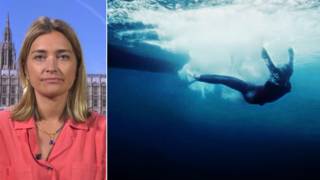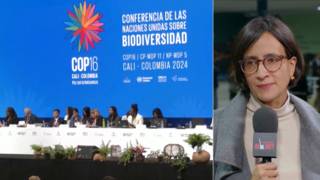
Related
Guests
- Kate Braumanone of the coordinating lead authors of the U.N. report. She is an environmental scientist at the University of Minnesota.
- Ashley Dawsonprofessor of postcolonial studies at the City University of New York Graduate Center and College of Staten Island. His books include Extreme Cities: The Peril and Promise of Urban Life in the Age of Climate Change and Extinction: A Radical History.
An alarming new report by a panel of leading scientists warns that human activity is causing the disappearance and deterioration of wildlife at a rate that could represent an existential threat to humanity within our lifetimes. The United Nations’ Intergovernmental Science-Policy Platform on Biodiversity and Ecosystem Services released its conclusions earlier this week and found that 1 million plant and animal species could go extinct in the foreseeable future unless current trends are reversed. The study estimates the global extinction rate is “already at least tens to hundreds of times higher than it averaged over the past 10 million years.” It is the largest and most comprehensive global study of biodiversity ever. It took three years to complete and is based on 15,000 scientific papers. The landmark report singled out industrial farming and fishing as major drivers of the crisis and called for “transformative change” to arrest present trends of biodiversity loss and species extinction. We speak with Kate Brauman, one of the coordinating lead authors of the U.N. report. She is an environmental scientist at the University of Minnesota. And we speak with Ashley Dawson, a professor of postcolonial studies at the City University of New York Graduate Center and College of Staten Island. His books include “Extreme Cities: The Peril and Promise of Urban Life in the Age of Climate Change” and “Extinction: A Radical History.”
Transcript
AMY GOODMAN: This is Democracy Now! I’m Amy Goodman, with Nermeen Shaikh.
NERMEEN SHAIKH: An alarming new report by a panel of leading scientists warns that human activity is causing the disappearance and deterioration of wildlife at a rate that could represent an existential threat to humanity within our lifetimes. The United Nations’ Intergovernmental Science-Policy Platform on Biodiversity and Ecosystem Services released its conclusions earlier this week and found that 1 million species could go extinct in the foreseeable future unless current trends are reversed. The study estimates the global extinction rate is, quote, “already at least tens to hundreds of times higher than it averaged over the past 10 million years.”
It’s the largest and most comprehensive global study of biodiversity ever. It took three years to complete and is based on 15,000 scientific papers. The landmark report singled out industrial farming and fishing as major drivers of the crisis and called for transformative change to arrest present trends of biodiversity loss and species extinction. The report will be released in full later this year. This is chair of the U.N. panel, Sir Robert Watson.
ROBERT WATSON: We’re losing species at a historical rate. Potentially 500,000 to a million species are threatened with loss. We have lost much of our native forests, much of our native wetlands. And effectively, biodiversity needs to be considered as an equally important issue as climate change. It’s not just an environmental issue; it is an economic issue, a development issue, a security issue, a social, moral and ethical issue.
AMY GOODMAN: To talk more about the report, we’re joined by two guests. In Minneapolis, Kate Brauman is with us, one of the coordinating lead authors of the U.N. science report, environmental scientist at University of Minnesota. And here in New York, Ashley Dawson is joining us, professor of postcolonial studies at City University of New York Graduate Center and College of Staten Island. His books include Extinction: A Radical History.
We welcome you both to Democracy Now! Kate Brauman, you’re one of the lead authors on this report. A million species going extinct? Explain.
KATE BRAUMAN: It is really shocking. What we’ve done is that a bunch of experts have looked at really what the trends look like for many, many different species, including insects. And looking at those trends, it’s quite clear that up to a million species, 25% of all of the animals on Earth, are threatened with extinction, many within the next couple of decades, unless we change our activities.
NERMEEN SHAIKH: And what most surprised you, Kate, about this report as you were working on the research?
KATE BRAUMAN: The thing to me that’s the most shocking is really just what the picture looks like when we bring it all together. So, this report is an assessment. It’s designed to bring together the incredibly large existing body of research. This was not designed to do new research. And so, much of this has been known. What we’ve done is really bring together all the pieces and lay them out clearly, so that we can see what a big problem this is.
AMY GOODMAN: Can you talk about the threat to biodiversity, ongoing species extinction and climate change?
KATE BRAUMAN: What we see is that there are a lot of different drivers that are causing this to happen and that they all interact with each other. So, probably the biggest threat to species to date has been land use change. We have made so many changes on the Earth, particularly through farming, but also through roads, through timber harvest, and that’s had a tremendous impact. But it interacts with climate change, and so what we see is that these interacting effects of land use change, climate, pollution, species extraction, that they all work together to really make huge threats to the environment and to us as humans.
NERMEEN SHAIKH: Well, I want to bring Ashley Dawson into the conversation. Ashley, you have written an entire book on the radical history of extinction. Your response to this report?
ASHLEY DAWSON: Well, the report, I think, is really a landmark report. And it shows that the crisis we face isn’t just one of climate change. In some ways it’s comparable to the IPCC report from last October, which really sounded a really important alarm about the system that we face and its potential collapse. But what this shows is it’s a crisis of multiple different dimensions and that it’s driven by an economic system which is fundamentally destroying the terrestrial systems that we all depend on.
NERMEEN SHAIKH: Well, I’d like to turn to Secretary of State Mike Pompeo’s recent comments on the Arctic. Just hours after the release of the U.N. report, Pompeo celebrated the shrinking levels of sea ice in the region, saying it opened up new opportunities for trade. He also called for the exploitation of natural resources in the Arctic.
SECRETARY OF STATE MIKE POMPEO: The Arctic is at the forefront of opportunity and abundance. It houses 13% of the world’s undiscovered oil, 30% of its undiscovered gas and an abundance of uranium, rare earth minerals, gold, diamonds and millions of square miles of untapped resources. Fisheries galore. … Steady reductions in sea ice are opening new passageways and new opportunities for trade. … Arctic sea lanes could come before the—could become the 21st century Suez and Panama Canals.”
NERMEEN SHAIKH: So scientists warn that melting sea ice in the Arctic due to climate change will have catastrophic effects on coastal cities, biodiversity and the global economy. President Trump, of course, has called climate change a Chinese hoax. So, Ashley, your response to what Pompeo said just hours after this U.N. report was released?
ASHLEY DAWSON: I think it typifies a kind of extractivist attitude, which, as I said, is destroying the planet. I mean, to give one concrete instance, we have been exploiting land so much and degrading land that we only have about 60 harvests left. Right? Sixty agricultural harvests left.
NERMEEN SHAIKH: What does that mean?
ASHLEY DAWSON: It means about only 60 more years of food, potentially. So, we’re not only talking about a kind of crash of biodiversity and potential extinction for a lot of species out there; we’re talking about a kind of fundamental crisis of humanity, its relationship to the natural world and our relations to one another.
AMY GOODMAN: And he’s saying, if the ice melts, it opens up possibilities for trade. It means you can get another Panama or Suez Canal.
ASHLEY DAWSON: Yeah, it gives new meaning to Naomi Klein’s term “disaster capitalism.” Right? I mean, this is really about yoking the planet as we push it towards unsustainability.
AMY GOODMAN: I want to get your response to this, as well, Kate Brauman, that if the sea ice melts, it just opens up opportunities for trade.
KATE BRAUMAN: Well, I will say that I see it as an opportunity, but as an opportunity for doing things better. One of the things we talk about a lot in this report is that we are not hopeless, that there are a lot of potential ways that we can have a better future. And one of those is really having better intergovernmental cooperation. The Arctic is a place where intergovernmental cooperation has happened in the past. And we have the opportunity to really manage and steward these resources in a positive way that can be a model for the way we think about the planet. Part of that is going to be really integrating what we know from indigenous and local cultures, many of whom have lived in these regions for a long time, into the way that we do management.
AMY GOODMAN: Ashley Dawson, you talk about radical conservation. What does that look like? And you particularly talk about cities. I am intrigued by the title of your book, Extreme Cities: The Peril and Promise of Urban Life in the Age of Climate Change.
ASHLEY DAWSON: Right. Well, so, right now we have a system of agribusiness that’s based on using fossil fuels for pesticides, fertilizers, and exploiting the land as much as possible. And we clearly need to shift. And one of the things that’s really wonderful about this report is that it explicitly talks about shifting that system to one that’s based on agroecology, using natural inputs, not using all of these pesticides that are destroying pollinators like bee populations and other insects.
And we don’t just need to think about that happening outside cities, right? Now the majority of humanity lives in cities. And so cities can also be a place for rewilding, for increasing some of the wetlands, for instance, that we have plowed under, and, by doing that, for absorbing more carbon. So I agree with Kate about how this report is sounding an alarm, but it’s also calling for really important shifts in attitude and material changes that can put us on a different course.
NERMEEN SHAIKH: What does that say, Ashley, about the kind of structural transformations that would be required minimally for the economic system that governs at this point large parts of the planet, which is based on endless expansion and consumption by larger and larger numbers of people at greater levels?
ASHLEY DAWSON: Yeah. I think it’s the greater levels that’s really key. I mean, the report does talk about the issue of population increase, but it also makes it quite clear that it’s inequality and a kind of capitalist system that’s based on constantly ramping up consumption of natural resources that is at fault, and that we need to shift away from that system.
AMY GOODMAN: What is the alternative?
ASHLEY DAWSON: What is the alternative? The alternative is a kind of Green New Deal for the planet. And the authors of the system talk about that. They say quite explicitly that we need a values shift and a material shift towards more sustainable forms of engagement with the planet.
NERMEEN SHAIKH: And, Kate, this report comes on the heels of several other climate reports, biodiversity reports. What is it that this report says that these other reports have not concluded?
KATE BRAUMAN: This report does a couple of different things. It brings together a wider body of evidence and really makes a point of elevating what we know from indigenous and local cultures. It makes a really explicit tie from human activities to biodiversity to human well-being. And then it points us in positive directions for the future. I think Ashley really summed this up right: We are identifying the need to really have transformational change, to redefine what it means to live well in a way that reduces our consumption and changes our production.
AMY GOODMAN: Let me ask you, Ashley Dawson, about the anthropocentric nature of the report as it frames species’ survival as a matter of human survival, perhaps concerned that humans won’t care that a million species will go extinct unless it’s put in terms of human beings going extinct.
ASHLEY DAWSON: Right, right. Well, you know, there is something about the report that is influenced by the times we live in. It’s called a report not just on biodiversity, but ecosystem services. And so that kind of neoliberal calculus is very evident from the report’s title itself. But I think that the report is sounding these alarm bells and not discounting the innate validity and importance of the natural world and of other life forms. It just wants to emphasize how intertwined we all are at this point—right?—and how we can’t break that link.
AMY GOODMAN: And, Kate Brauman, if you’d like to respond to that?
KATE BRAUMAN: I agree. It is an anthropocentric take. And that, I think, is very important, because, as Ashley says, we are not separate or unlinked from the environment. And stewarding the environment, whether we’re doing it for personal gain or because we care, is what we as humans are doing. And that brings us to the center in ways that I think are very important in terms of moving forward and changing our behavior and changing this trajectory.
AMY GOODMAN: And do you see policymakers responding?
KATE BRAUMAN: I think so. One of the things that’s so exciting about this is that it is a report of the governments. There are 132 member states who are part of his platform, and they approved this document. This is something that governments say “we think is important.”
AMY GOODMAN: We want to thank you both for being with us. Of course, we’re going to link to the report. Kate Brauman is one of the coordinating lead authors of the new U.N. report on extinction, environmental scientist at the University of Minnesota, speaking to us from Minneapolis. And Ashley Dawson is a professor at the CUNY Graduate Center. His books include Extinction: A Radical History, as well as Extreme Cities: The Peril and Promise of Urban Life in the Age of Climate Change.
That does it for our show. Democracy Now! is currently accepting applications for paid 6-month internships here in our New York City studio. Learn more at democracynow.org.












Media Options